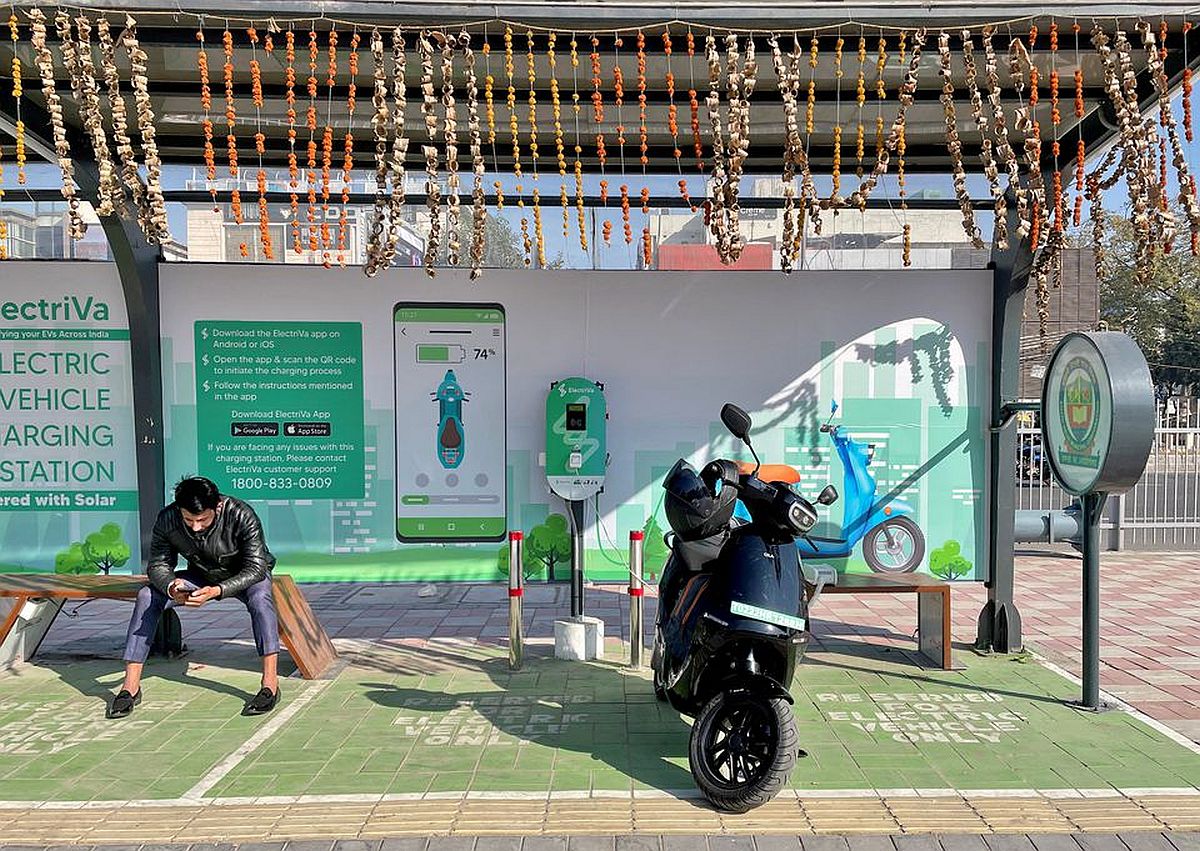E-scooter sales slow down as global chip shortage woes continue
The electric scooter juggernaut which has been picking up momentum with heady growth month-on-month is now slowing down.
IMAGE: A man checks his mobile phone as he waits while recharging his Ola electric scooter at an electric vehicle charging station in New Delhi. Photograph: Aditi Shah/Reuters
The combined number of registrations in April of eight electric two wheeler companies has seen a dip of over 1 per cent to 43,061 vehicles, according to data from the Ministry of Road Transport & Highways’ site VAHAN.
The reasons are the continuing shortage of chips, especially after the Ukraine-Russia war, and the spate of fires which have led to scooters being recalled by manufacturers.
The minor dip has to be seen, though, against the background of recent growth: registration of scooters sold by them went up by 58 per cent in March over February and grew by 15 per cent in February over January.
The largest drop has been in Hero Electric, one of the largest players in the market.
Registration of its scooters fell by half from 13,029 in March to 6,570 April.
While Bangalore-based Ather Energy has been seeing its registrations not going up in April to over 3,000 levels, other smaller companies have seen even larger dips.
Pur Energy — a 15 per cent fall in April over March; Revolt — 12 per cent; and Benling India – 19 per cent.
These figures could be the beginning of consolidation, say analysts.
Registration figures are generally lower than overall sales figures as it might take a few days for a scooter sold to get registered.
What has kept the overall number stable is the fact that the registration of Ola Electric scooters rose to 12,683 in April, an increase of 39 per cent over March, despite the controversy over one of its scooters getting overheated and leading to a voluntary recall.
Okinawa also saw a growth in registrations of 32 per cent in the same period, hitting 11,011 in April.
Analysts say both companies, especially Ola, have been able to source their chips and build a reasonable inventory which has helped them tide over the crisis better than the others.
The numbers of only electric scooters registered by incumbent players such as Bajaj Auto, TVS, and HMSI are not available separately on VAHAN but according to estimates, they account for 7 per cent of the sales in February.
Ather Energy’s co-founder Tarun Mehta said the slowdown was primarily on account of the chip shortage: “There are many chips which have a 100 week waiting time.
“We want to do 10,000 units a month but we are not being able to do even 30 per cent of that because chips are not available.
“The situation is 30-35 per cent better than what it was in February, but we had expected the shortage would be over by August.
“Now it looks like the shortage will continue till 2023,” said Mehta.
A similar problem confronts Hero Electric. Managing director Naveen Munjal hopes the company can meet the year’s sales target despite the chip shortage.
“We may be close to normal dispatches from May onwards.
“Challenges in the supply chain will remain for a while but we are confident of hitting our planned numbers this year,” he said.
Analysts, however, say the growth in electric scooter sales will continue to slow down.
HDFC Securities predicts that, despite the aggressive expansion plans and demand momentum, electric two wheeler adoption will slow down and grow at a slower than expected pace.
The reason is the persistence of chip supply challenges till calendar year 2022 and the recent fire incidents which will force OEMs to focus on launching products only after thorough quality and safety checks.
Analysts project that electric vehicle penetration in scooters will reach only 25 per cent in FY’25, up from around 7.6 per cent in FY’22.
For all the latest business News Click Here

